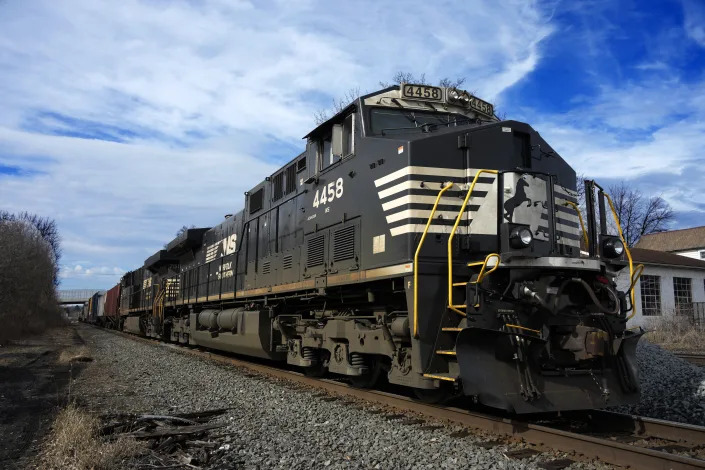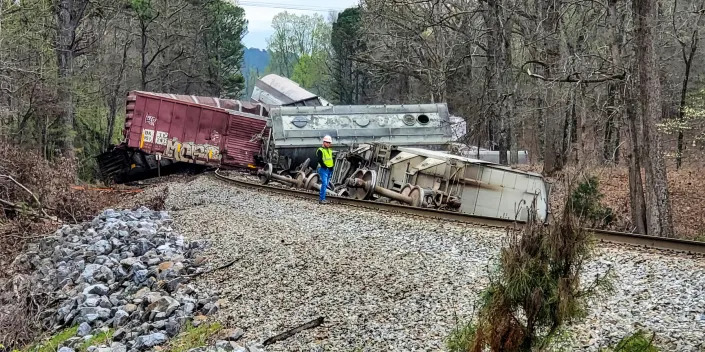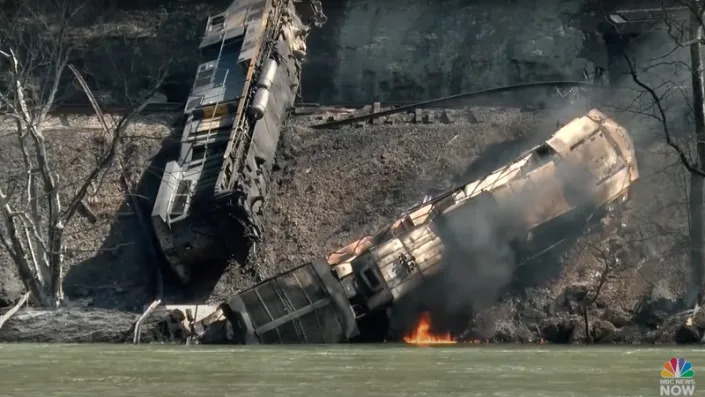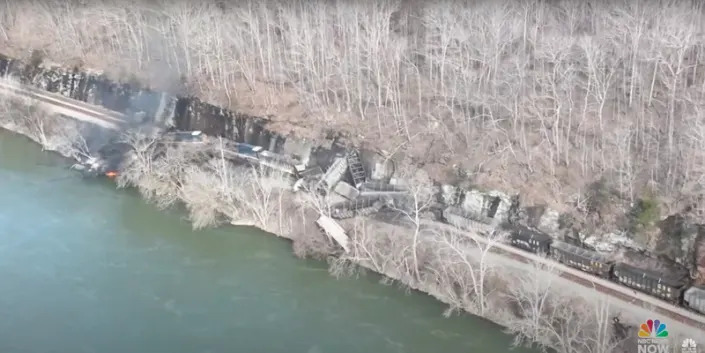Ohio senators blast Norfolk Southern business practices at East Palestine hearing

Zack Budryk
Thu, March 9, 2023
Both of Ohio’s senators took aim at the Norfolk Southern railway’s handling of an East Palestine, Ohio, derailment Thursday as CEO Alan Shaw testified before the Environment and Public Works Committee.
Sen. J.D. Vance (R-Ohio) and Sen. Sherrod Brown (D-Ohio), were present as witnesses rather than members of the Senate panel.
Vance criticized both Norfolk Southern and the federal response, and specifically invoked the railway safety reform bill he and Brown have co-sponsored. The measure would, among other provisions, give the federal government rather than railroads oversight over the heat sensors on railroad tracks.
A heat sensor registered as severely overheating just before the East Palestine derailment.
Vance said his GOP colleagues have discussed the bill “in complete good faith” but blasted a “particular slice of people” within the conservative movement “who seem to think that any public safety enhancement for the rail industry is a violation of the free market.”
Vance called such claims a “farce,” pointing to the federal subsidies and legal carve-outs the rail industry receives and the bipartisan measure Congress passed in December to block rail unions from striking.
“You cannot claim special government privileges and then resist basic public safety,” the freshman Ohio Republican said, going on to suggest that Republicans could not sincerely present themselves as aligned with the working class if they “do the bidding of a massive industry that is in bed with big government.”
Brown took aim at Norfolk Southern’s safety record, noting multiple accidents involving the company since December 2021, three of which resulted in worker deaths.
The railroad, Brown said, has “followed the Wall Street business model” by hoarding profits at the expense of safety measures, spending billions last year on stock buybacks alone.
“If Norfolk Southern had paid a little more attention to safety and a little less attention to profits, had cared a little more about the Ohioans along its tracks and a little less about its executives and shareholders, these accidents would not have been as bad for maybe not happened at all,” Brown said.
Norfolk Southern CEO Alan Shaw, who agreed to testify at the same hearing, issued an apology earlier Thursday morning. The Environmental Protection Agency (EPA) has asserted its authority under the Comprehensive Environmental Response, Compensation, and Liability Act to require the company to cover all costs associated with recovery and cleanup.
Norfolk Southern CEO refuses to support rail safety bill in Senate testimony
Norfolk Southern CEO refuses commitment to give all employees 7 days paid sick leave
Christopher Wilson and Rebecca Corey
Thu, March 9, 2023
Norfolk Southern CEO Alan Shaw refused to endorse bipartisan rail safety legislation Thursday in his first congressional testimony since last month’s toxic train derailment in East Palestine, Ohio.
During the Senate Committee on Environment and Public Works hearing, Chairman Tom Carper, D-Del., asked Shaw if he would support the Railway Safety Act.
“We are committed to the legislative intent to make rail safer,” Shaw said. When asked if there were provisions he did support, Shaw cited tighter standards on tanker cars, more funding for first responders and an increase in the number of railside detectors that monitor trains.
Carper was relaying a question from Sen. John Fetterman, D-Pa., who did not appear at the hearing as he continues treatment for clinical depression.
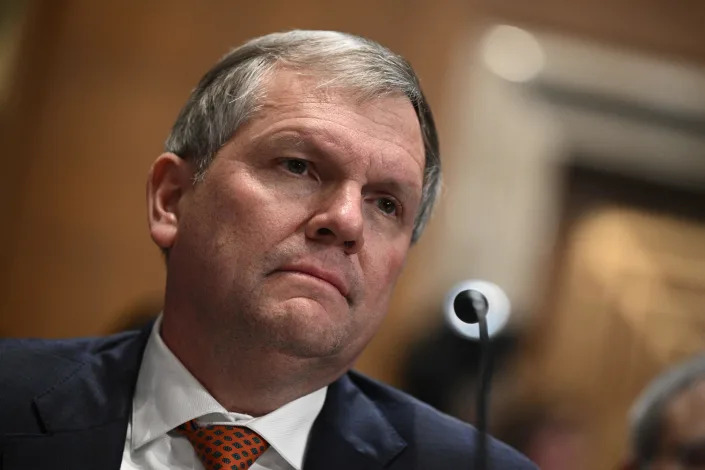
Norfolk Southern president and CEO Alan Shaw testifying at a Senate Committee on Environment and Public Works hearing on Thursday. (Brendan Smiakowski/AFP via Getty Images)
Sen. Sherrod Brown, D-Ohio, and Sen. J.D. Vance, R-Ohio, introduced the Railway Safety Act last week with co-sponsors from both parties. The bipartisan bill would establish new safety measures for railroads, including setting nationwide requirements for devices “designed to automatically detect wheel bearing and other mechanical issues” as well as require railroads to create disaster plans and inform emergency response commissions of any hazardous materials going through their states.
It also increases fines for safety violations, and aims to address questions arising in the aftermath of the East Palestine incident, such as why Ohio wasn’t informed of the train’s hazardous cargo.
Early in the hearing, Vance called on his Republican colleagues to side with the people of East Palestine over the rail company. Prior to Shaw’s testimony, Brown said he was seeking a promise to support the bill.
“If this company is serious in its commitment to preventing more East Palestines in Ohio and across the country,” Brown said, “I hope today Mr. Shaw will endorse our common-sense bipartisan plan. Sen. Vance and I come from different parties, different philosophies, but on this we’ve come together for the people of our state, and I appreciate his work on this.”

Sen. Sherrod Brown. (Anna Moneymaker/Getty Images)
In an exchange with Sen. Ed Markey, D-Mass., Shaw said his company had already made major investments in safety: “Our safety stats, senator, continue to improve, and I am committed to making Norfolk Southern safety culture the best in the industry.”
“You’re not having a good month,” replied Markey. “It seems like every week there’s another accident that Norfolk Southern is a part of in our country.”
Hours before the hearing began, a Norfolk Southern train derailed in Alabama, with authorities saying there were no injuries and no hazardous materials present. On Saturday, a Norfolk Southern train derailed in Springfield, Ohio, in at least the fifth derailment the company has had in the state since October.
The company has seen an increase in both profits and accidents in recent years, as it runs longer and heavier trains while cutting its workforce; Politico reported Wednesday that Norfolk Southern had the biggest increase in its accident rate over the last decade among major freight carriers. ABC News reported Thursday that federal regulators were looking into a complaint alleging that Norfolk Southern ignored an incident last month regarding one of the company’s trains carrying hazardous materials in North Carolina.
In advance of the hearing, Norfolk Southern on Monday announced a six-point safety plan meant to address overheated bearings, which the National Transportation Safety Board said was the likely cause of the Feb. 3 derailment.

During Shaw's tenure, Norfolk Southern has seen an increase in both profits and accidents. (Brendan Smialowski/AFP via Getty Images)
Carper concluded the hearing by observing that Shaw had given few direct answers during questioning.
“I’m not a big fan, Mr. Shaw, of ‘yes’ [or] ‘no’ answers. That’s not usually my style,” Carper said. “But I didn’t think we heard as many unequivocal ‘yesses’ as I might like to have, and we might want to revisit that at another time.”
Earlier during the hearing, Vermont Sen. Bernie Sanders accused Shaw of sounding “like a politician” after Shaw refused to guarantee “at least seven paid sick days” to all of his employees, some of whom Sanders said currently have no paid sick leave — underscoring the exhaustion of a depleted workforce that employees have been describing in the aftermath of the disaster. Last week, a union official accused Norfolk Southern of endangering workers who were doing the cleanup.
“Paid sick days is not a radical concept in the year 2023. I am not hearing you make that commitment to guarantee that to all of your workers,” Sanders said after asking for a yes or no response.
“I’m committed to continuing to speak to our employees about quality of life issues that are important to them,” Shaw replied.
Sanders also pressed Shaw about covering the health care needs of residents affected by the train derailment. Residents have already reported a host of symptoms in the days and weeks after the disaster, including painful and difficult breathing, fatigue and rashes.
“You talked about covering the needs of the people of East Palestine,” Sanders said. “Does that include paying for their health care needs? All of their health care needs?”
“Everything is on the table, sir,” Shaw responded.

Sen. Bernie Sanders speaking on Thursday during a Senate hearing on the Norfolk Southern train derailment. (Anna Moneymaker/Getty Images)
Shaw was also pushed on the company’s previous lobbying against safety measures. “Since 2002, the rail industry has spent more than $650 million on federal lobbying, with another $60 million spent on state lobbying,” Sen. Sheldon Whitehouse, D-R.I., said, adding that Norfolk Southern was the fifth-biggest spender among rail companies. The company said it had “opposed additional speed limitations and requiring [upgraded electronic] brakes” in a 2015 lobbying disclosure.
Norfolk Southern says it has provided more than $21 million to East Palestine in the weeks since the crash. (The company had initially pledged $25,000 to support “the efforts of the American Red Cross and their temporary community shelters” and offered affected residents $1,000 “inconvenience fees.”) In 2021 and 2022, the company spent billions on stock buybacks and had announced intentions to spend billions more.
Scrutiny over the company came after one of its trains derailed minutes from the Ohio-Pennsylvania border on the evening of Feb. 3, with the governors of both states issuing a joint evacuation order for a roughly one-mile radius, since 11 of the cars contained hazardous materials.
On Feb. 6, Norfolk Southern burned off five tankers full of vinyl chloride in what it said was an effort to avoid a catastrophic explosion, but it resulted in images of a giant toxic smoke plume that quickly circulated on social media. Two days later, residents were urged to return home, despite a lingering smell in the air and reports of such symptoms as dizziness, headaches and rashes.
Norfolk Southern’s call to burn derailed train cars ‘jaw-dropping’, Senate hears
Chris Stein
Thu, March 9, 2023

Photograph: Rex/Shutterstock
Norfolk Southern’s decision to call for the burning of five derailed train cars in East Palestine, Ohio, was “jaw-dropping” and a consequence of poor communication by the railroad, a local emergency management official told a Senate panel on Thursday.
Eric Brewer, director and chief of hazardous materials response for the emergency services department in Beaver county, Pennsylvania, just over the state line from East Palestine, described to the chamber’s environment and public works committee an initially chaotic response to the 3 February derailment.
Related: ‘No one is coming to save us’: residents of towns near toxic train derailment feel forgotten
“The boots on the ground crews were great to work with. It seems as bosses or management gets there, that’s where the communication failures start,” Brewer said.
The derailment of the train carrying vinyl chloride – used to produce PVC plastic – in the small town has left its more than 4,700 residents complaining of health effects like headaches, and fearing long-term pollution of the area. An interim report released last month by the National Transportation Safety Board (NTSB) noted the train’s crew received an alert about an overheating wheel bearing and tried to slow the train before it came off the tracks.
Brewer, whose agency was among those responding to the accident, described how Norfolk Southern initially raised concerns that one of the derailed tank cars was “starting to heat up” and could explode, leading to local officials creating an evacuation zone around the site of the accident. The railroad then suggested destroying that tank car in a controlled detonation, he said.
“We were assured this was the safest way to mitigate the problem,” he said. Then, Norfolk Southern asked to burn five cars, rather than just one.
“This changed the entire plan, as it would now impact a much larger area. I think this confusion was probably a result of the lack of communication from Norfolk Southern and the fact that they they weren’t present during these planning meetings,” Brewer said.
He later added: “The decision to go from the one tank car to the five was jaw-dropping,” and “that’s probably why we’re here today”.
His critique was echoed by Anne Vogel, director of Ohio’s Environmental Protection Agency, who said: “I do believe there were quite a few gaps in communication and missteps in the very eye hours following the derailment … things could have been handled better in the beginning hours.”
However, both Brewer and Vogel agreed that the communication issues had been ironed out since then. “I do believe that those gaps in communications have been addressed. I believe that teams are working well together on the ground today.”
The Democratic-led committee’s hearing featured the first appearance before Congress by Norfolk Southern’s CEO, Alan Shaw, who was pressed by lawmakers on how far his company would go to take care of Ohio and Pennsylvania residents affected by the derailment.
“I’m terribly sorry for the impact this derailment has had on the folks of that community. And yes, it’s my personal commitment and Norfolk Southern’s commitment that we’re going to be there for as long as it takes to help East Palestine thrive and recover,” Shaw said.
He also said that though the NTSB report found that the train’s crew was operating in a safe manner, “it is clear the safety mechanisms in place were not enough.”
Shaw was more taciturn about whether he would support the Railway Safety Act of 2023, proposed by Democratic and Republican lawmakers from Ohio and Pennsylvania, which would levy financial and regulatory consequences on railroads involved in accidents.
“We are committed to the legislative intent to make rail safer. Norfolk Southern runs a safe railroad and it’s my commitment to improve that safety and make our safety culture the best in the industry,” Shaw said.
Another topic of concern for senators was the extent of pollution in East Palestine and the surrounding communities. Environmental Protection Agency regional administrator Debra Shore said indoor air monitoring had not yet turned up any sign of widespread vinyl chloride contamination.
“As of March 4 approximately 600 homes have been screened through this program and no detections of vinyl chloride or hydrogen chloride have been identified,” Shore said, adding that air monitors haven’t detected any organic compounds “above levels of health concerns” since the derailed cars were extinguished.
The EPA’s assurances were not enough for East Palestine resident Jessica Conard, who traveled to Washington for the hearing.
“I think that what they’re saying is true. I think that the reports are true, I think that the tests are accurate. But I just think that it’s a matter of time before our groundwater is contaminated,” she told the Guardian.
Both of Ohio’s senators testified before the committee, and said they were determined to make sure the town’s long-term needs weren’t forgotten as public attention recedes.
“These communities have been abandoned too many times before,” said the Democratic senator Sherrod Brown. “My job, our job, is to hear their voice and to demand corporate accountability to bring this town back to the vibrant community we know that it can be again.”
‘Time for Choosing’: J.D. Vance Urges Fellow Republicans to Back Crackdown on Rail Industry
Jeff Zymeri
Thu, March 9, 2023

During a Thursday hearing of the Senate Committee on Environment and Public Works, Ohio senator J.D. Vance accused fellow Republicans of setting up roadblocks in his attempt to hold the rail industry accountable.
Vance and fellow Ohio senator Sherrod Brown are proposing the Railway Safety Act, which would boost safety requirements for trains carrying hazardous materials, call for more frequent inspections of rail cars, increase fines for safety violations, and greenlight $27 million to examine possible other safety improvements.
“Are we for big business and big government or are we for the people of East Palestine? It’s a time for choosing. Let’s make the right one,” explained Vance.
The committee gathered to hear testimony from those involved in responding to the derailment of a Norfolk Southern train in East Palestine, Ohio, where toxic chemicals were spilled and residents complain of health issues. One of them was under-fire Norfolk Southern CEO Alan Shaw.
While Vance explained he was frustrated at first with Norfolk Southern’s response, he has since been placated. However, for Vance, it’s too little too late for the industry at large.
Vance argued that free-market Republicans who are opposed to regulating the rail industry more tightly are hypocritical.
“This is an industry that enjoys special subsidies that almost no industry enjoys. This is an industry that enjoys special legal carve-outs that almost no industry enjoys,” said Vance. “This is an industry that just three months ago had the federal government come in and save them from a labor dispute. It was effectively a bailout and now they’re claiming before the Senate and the House that our reasonable regulation, our reasonable legislation, is somehow a violation of the free market. Well pot, meet the kettle, because that doesn’t make an ounce of sense.”
“Do we do the bidding of a massive industry that is embedded with big government or do we do the bidding of the people who elected us to the Senate into the Congress in the first place?” Vance asked.
Some Republicans have expressed concern that the legislation goes too far and many of the details are left to the Department of Transportation.
“We’ll take a look at what’s being proposed, but an immediate quick response heavy on regulation needs to be thoughtful and targeted,” explained Senator John Thune (R., Sd.) to The Hill. “Let’s define the problem. Let’s figure out what the solutions are and if there are things we need to fix, we’ll fix them.”
Thune added that he was “uncomfortable” giving “much more power” to Transportation Secretary Pete Buttigieg, who has come under intense criticism for his response to the East Palestine derailment.
For Vance, holding the rail industry accountable is something a Republican party that has experienced a profound realignment should champion.
“We are the party of working people in this country…We are the party of firefighters, of police officers, of the people who go to work pay their taxes, fight our country’s wars and keep our community safe,” Vance said. “We’re proud of that.”
Regarding East Palestine, the Ohio senator also expressed concern that the people there were not only overlooked in favor of big business, but also because of who they are.
“I think that our leadership, our media, and our politicians were slow to respond to this crisis in part because a certain segment of our leadership feels like the people of East Palestine are a little out of style,” he said.
“They have the wrong politics, they’re a little too rural, maybe a little too white,” Vance explained.
Shaw, who as chief executive Norfolk Southern leads one of the nation’s largest rail companies, expressed his deep apologies at the hearing for what had occurred and repeated over and over again that he’s committed to “doing the right thing.”
But Shaw had to contend with the symbolism of another train derailment in Alabama on the same day as his testimony, underscoring the crisis that has blanketed the rail company. The NTSB took the unusual step of opening a broader, special investigation into Norfolk Southern’s safety practices after a train conductor was killed in Cleveland earlier this week.
Senators pressed Shaw to make specific commitments in their allotted time, but the chief executive often broadened out to his larger commitment to doing the right thing. This led Senator Bernie Sanders (I., Vt.) to remark to Shaw: “With all due respect, you sound like a politician.”







